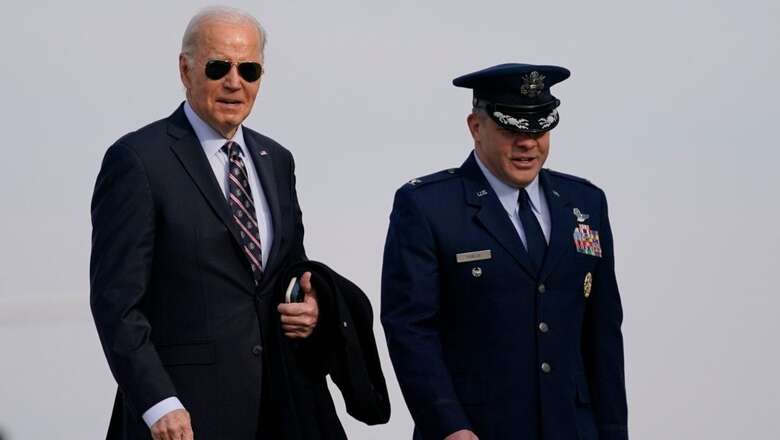
views
US President Joe Biden on Thursday said rival Iran is not well-liked in the region, blaming it for creating new tensions by carrying out missile strikes in Pakistan targeting Sunni militants who have attacked Iranian armed forces along the Iran-Pakistan border.
“As you can see Iran is not particularly well liked in the region and where that goes, we’re working on now. I don’t know where that goes,” Biden said while speaking to reporters in Washington. White House national security spokesperson John Kirby told reporters on Air Force One as Biden flew to North Carolina that Washington is monitoring the Iran-Pakistan clashes closely.
“We don’t want to see an escalation clearly in South and Central Asia. And we’re in touch with our Pakistani counterparts,” Kirby said.
Iran struck targets that it claimed to be headquarters of Jaish-al-Adl this week. The group has been designated a terrorist group by the US, New Zealand and Japan along with Iran but Iran on several occasions has claimed that the US is backing Pakistan-based Jaish-al-Adl.
A report by Foreign Policy from 2012 claims that during the tenure of former US president George W. Bush Israeli Mossad officers recruited members of the terrorist group Jundallah by posing as American agents, utilising US passports and funds. .
The memos, investigated by US intelligence officials, debunked previous accusations of the Central Intelligence Agency (CIA) covertly supporting Jundallah, clarifying the involvement of Israeli operatives in a “false flag” operation.
Mossad officers posing as CIA operatives met with Jundallah officials in London.
Jundallah is known for its extremist activities, including assassinations and attacks on Iranian officials and civilians and is the mother organisation from where splinter group Jaish-al-Adl broke away from a few years ago.
Iran has also blamed Saudi Arabia, its regional rival, for backing Jaish-al-Adl.
Iran believes that Saudi Arabia, US and Pakistan continue to back the group to deter it from backing the Iran-backed “axis of resistance” consisting of Palestinian terrorist group Hamas, Lebanese Hezbollah and Yemeni Houthi militants. It believes that these nations are working together to shift Iran’s focus from what is happening in the Gaza Strip.
The US wants to corner Iran over the Houthi attacks on international shipping in the Red Sea and is angered that it carried out airstrikes on Iraq this week claiming that it was an Israeli espionage centre in Iraq’s semi-autonomous Kurdistan region.
It also fired missiles at Islamic State militants in Syria, in response to a bombing that killed scores of people at a commemoration for the famed commander Qassem Soleimani in central Iran, further angering the US.
Biden’s comments which appear to blame Iran for initiating fresh conflicts in South Asia could have been made with an eye on elections in November where he has to look tough in front of Americans when it comes to Iran.
However, the US administration is not taking into account the fact that Pakistan has harboured several terrorist groups and has threatened peace in the region. Several terrorist groups like the Tehreek-e-Taliban Pakistan (TTP), Jaish-e-Mohammad (JeM) and Lashkar-e-Taiba (LeT) who have threatened peace in the region have been backed by the Pakistan Army and the Inter State Intelligence (ISI). Iran also blamed ISI and Pakistan Army for backing Jaish-al-Adl on several occasions.
The US officials also evaded questions from reporters on whether Pakistan held prior consultations with Washington before conducting retaliatory air strikes on Iran. US state department spokesperson Matthew Miller did not respond to questions on media reports claiming that Pakistani officials spoke to their US counterparts before conducting the retaliatory strikes.
“I do not have any private conversations to read out,” Miller said.
“We noted the comments from the government of Pakistan, about the importance of cooperative relations between Pakistan and its neighbours. We thought those were productive, useful statements, and certainly, there’s no need for escalation and we would urge restraint on all sides in this case,” he further added.



















Comments
0 comment